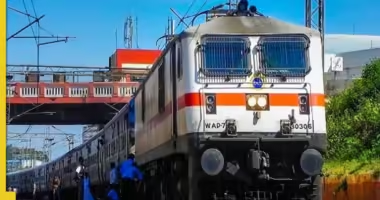The Indian Railways has issued a stern warning to the Farmers’ Union, emphasizing the importance of purchasing tickets for train travel to its events. This move comes in response to a growing trend of ticketless travel, prompting authorities to take decisive action. In this article, we’ll explore the implications of this warning, its potential impact on farmers, and the broader consequences for railway operations.
The Context: Farmers’ Union and Rail Transport
India’s agricultural sector has always relied heavily on rail transport for moving commodities and attending events across the country. The Farmers’ Union, a significant entity representing thousands of farmers, organizes numerous gatherings and protests. Trains often serve as the primary mode of transportation for its members, making accessibility and affordability critical issues.
Railways’ Warning: Key Details
Amidst a rising concern over the misuse of railway services, the Indian Railways has made it clear that ticketless travel will not be tolerated. Here’s what you need to know about this latest move:
- **Notice to Farmers’ Union:** A warning letter was issued, addressing the union’s pivotal role in ensuring that members adhere to ticketing norms.
- **Financial Implications:** The Railways highlighted revenue losses due to ticketless travel, urging compliance to maintain the financial health of services.
- **Potential Punishments:** Repeat offenders may face penalties, including fines and legal actions, to deter non-compliance.
Impact on Farmers
The warning has stirred reactions within the farming community, given their dependence on railways for movement. Let’s delve into how this could affect them:
- **Increased Travel Costs:** Mandatory ticket purchasing could stretch the limited budgets many farmers operate within, impacting their participation in union activities.
- **Strain on Resources:** Farmers may have to allocate additional resources and efforts to secure travel tickets, potentially complicating logistics for large groups.
- **Broader Mobility Challenges:** For those residing in rural areas, increased travel costs and planning could limit access to railway services.
Why is This Important? The Bigger Picture
The Indian Railways’ action is not simply a matter of enforcing rules but also a step towards maintaining order and financial stability. Let’s explore why this is crucial:
- **Sustainable Operations:** By ensuring that passengers pay for services, the Railways can sustain and improve infrastructure, benefiting all travelers, including farmers.
- **Equitable Services:** Adhering to ticketing rules prevents abuses of the system, ensuring fairness for all passengers.
- **Public Safety:** With proper ticketing, the railways can manage passenger loads better, reducing the risks associated with overcrowding.
Challenges in Implementation
Enforcing ticketing compliance for large groups like the Farmers’ Union certainly presents distinct challenges:
- **Mass Mobilization:** Coordinating thousands of farmers to comply with ticketing norms can be logistically demanding.
- **Communication Barriers:** Effectively communicating the implications of non-compliance across diverse linguistic and regional backgrounds can be a hurdle.
- **Potential Protests:** The Farmers’ Union’s dissatisfaction with the move could lead to protests, adding an additional layer of complexity for authorities.
Collaborative Solutions: Meeting Halfway
For a smoother transition to stricter compliance, both parties can work together productively. Here are some suggestions:
- **Special Concessions:** Railways could explore offering temporary discounts or subsidies for farmers during major events.
- **Enhanced Communication:** Both parties can engage in dialogue to better understand mutual needs and constraints.
- **Digitization of Ticketing:** Simplifying the ticket booking process, perhaps via mobile applications, could ease the transition for farmers.
Conclusion: Moving Forward
The Indian Railways’ crackdown on ticketless travel by the Farmers’ Union underscores the need for rule adherence not just in letter, but in spirit. As both farmers and railways navigate this change, there lies an opportunity for developing a model of coexistence that respects regulations while acknowledging the unique challenges faced by the agricultural community. By ensuring compliance, the railways can enhance service quality, safeguard revenue, and continue being the lifeline that unites India’s vast landscapes and people.
“`






